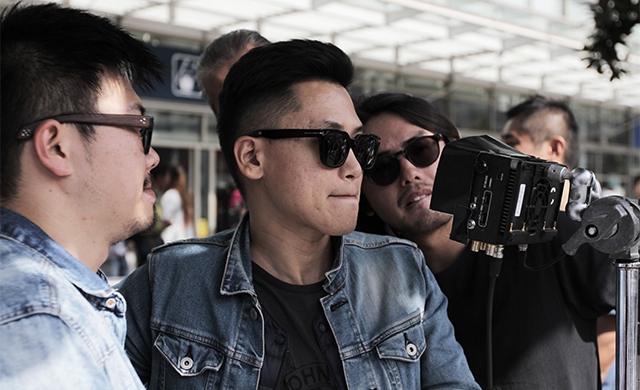遇到王砺珉是我们在年初最大的惊喜,在过去两年里许多让SHP+编辑们津津乐道的电视广告终于给对上了号 —— 我们不久前选出的 “SHP+最喜爱的2014广告”里的两条央视春晚的公益片:《筷子篇》和《感谢不平凡的自己》,后者的导演就是王砺珉。
今年是王导入行的第十个年头,时间上已经不算新导演,不过他还是希望自己保持新导演的激情与上进。2004年学成回国,到了2010年转战在数字化内容和新媒体的时代,王导才像刚出道的新人一样,真正获得了更多施展才华的机会。他多年的修炼和专业底蕴很快地让他厚积薄发:从《优衣库:陈坤与倪妮》独特的灰冷色调和细致的镜头质感,体现了导演成熟的镜头语言;中国梦之声的形象片引领了“青年态度”的主题片潮流、在央视《感谢不平凡的自己》里对情感的处理感人而不发腻;最新的YSL《危险红唇》短片系列里,他对节奏感和国际时尚的风格让人印象深刻。
我们觉得王砺珉中国影视广告导演新势力的代表:这一代人深受欧美流行文化和审美的影响,他们经历过技术和时代的变迁,他们有想法、有活力,他们尊重传统,但更热衷创意与趣味。无论扔给他们什么的脚本,他们首先想到的可能是如何贴上个人的标签——虽然偶尔也要为生存做出妥协,我们想信他们就是中国广告影视片前行的新生力量。

喜欢较真的人:“唔唔……还差那么一点点,准备第10take吧。” Wang is in some serious reviewing.
Q: 听说你在海外主修过导演专业?可否介绍一下自己的背景?
我在国内大学学的是艺术设计专业。但是因为一直梦想做电影,毕业以后我去了英国学电影。我先后读了两个学校:第一个布里斯托大学( University of Bristol),学的是电影制作的硕士,但英国的硕士是一年学制的,我觉得还不够。在毕业前,我就去申请了英国著名的伦敦电影学院(London Film School)继续学习。在布里斯托大学里有一半课程还是理论,但到了伦敦电影学院的两年里,基本上就没有理论课了,都是实际拍摄制作的东西。
Q: 学到了什么实用的东西?
伦敦电影学院是不具体分专业的,每个学期里电影制作过程中的所有课程大家都必须参加。例如摄影,所有人都要学会把一套35mmm摄影器材从零部件组装成拍摄前的待机状态,包括把胶片装入片盒,拍摄完最后取出等。学校还会安排大师课程,例如我就读的学期中,曾经请来过校友,拿过戛纳最佳导演的Mike Leigh来给我们上过一系列的导演课程。
每个学期末我们会拍几部短片电影,每个学生在这些短片制作中寻找自己的位置,比如说摄影师、导演、美术或者剪辑……当然这就是竞争了。因为大部分人只想做导演。一般脚本被选中的就会成为导演,他就有权来选择和搭配自己的制作成员。这其中是有利有弊,但这就是学校的初衷,想让大家得到像在实际社会中那样的环境锻炼,因为这个圈子里也是需要人脉,需要整合资源的。
Q: 回国以后是怎么样开始导演之路的?
我在2004年毕业后回国发展。当时的想法还比较天真,觉得自己在学校做过短片,把短片给了制作公司就有机会做(导演)。我先进入了观池当副导演,后来希望状态能更自由,于是选择了跳出公司做自由导演,因为我是一个对自由和个人空间要求很高的人。
Q: 你的最初规划就是从广告电视导演到电影导演的路线吗?
有些学电影的人是一开始就走进了电影的圈子,但我比较喜欢从广告先开始。因为广告的视觉表现手法更丰富,也可以锻炼更多的镜头语言。另外,就是可以比较快的生存。因为那时候(毕业时期)不像现在,中国的电影市场还没有那么红火,拍电影还不能到那维持生存的状态 。自己喜欢的电影导演David Fyncher (《消失的女孩》、《博击会》, 有强烈的黑暗风格和视觉冲击力)、Jonathan Glazer (《性感野兽》,出色的用视觉讲故事型导演,画面和故事充满着独特的魅力),Michel Gondry (《美丽心灵的永恒阳光》,以天马行空的风格著称) 本身就是很厉害的广告导演,广告里就可以看到他们的视觉特点,在转到电影后,拍出来的电影结构和视觉都非常有意思。所以我也希望能走这条路。
“有了态度,才能沉淀,很多技术才可以进步。有了态度,才会有更多原创的技术诞生。我喜欢‘较真’的态度。”
Q: 你去年为央视春晚导演的公益广告《感谢不平凡的自己》非常出色,你今年和央视继续合作吗?
是的,今年的代理商是法国的“佛海佛瑞”(Fred & Ferid),虽然脚本的内在核心还是“回家”的主题,但却用了一个看似平常但却很有回味和意义的形式去表现。要让13亿天南海北的观众都看懂而且感动,本身就是一个挑战。
Q: 你认为现时中国制作水平上最需要提高的哪一方面?
单从制作水平来说,首先还是一种“专业态度”吧,有了态度,才能沉淀,很多技术才可以进步。有了态度,才会有更多原创的技术诞生,而不是总跟在别人后面。我喜欢“较真”的态度。
Q: 出道十年,你见证过中国影视广告的发展,在你看来最大的进展是什么?
风格更多样了,个性化风格的导演越来越多了。
Q: 你认为你还是一位年青导演吗?
我希望我自己一直要有新导演的心态,因为新导演代表着你有更新的创造力和激情。2005和2010间,我的状态属于比较懒比较慢,虽然也有工作,但不忙,我又热爱旅游喜欢到处跑,象去印度,古巴啊,一呆就呆一个月,可以说是一个慢生活的状态。这种状态的另一个好处就是我看了很多很多的电影。
Q: 在近十年的积累经验,特别是近几年片子的拍得越来越多,你现在开始准备拍电影了吗?
电影是需要花上一两年甚至更长的时间才可能做得好的项目。现在还在积累故事素材阶段,我觉得这是一个水到渠成的事,急不来。但是如果有好的脚本是有可能的,我觉得最好的(办法)是我自己有个好想法,再找一个好的编剧一起合作。
不过即使做了电影,我也还是想继续做广告,因为广告可以让我尝试很多新的视觉手法和最新的视觉特效,很有趣。另外广告其实也是一个能不断了解观众的手段,什么故事他们看懂了,什么故事他们感动了,其实对以后通过电影讲故事是很有帮助的。广告对我一直都很有吸引力。
对于年青导演来说,电影总这么近,那么远的梦。不过对于王砺珉来说,追梦的路途永远不会寂寞,因为每条广告可能就为通向梦想的路上铺好了一个砖块。现在摆好小凳子,让我们围观王导今年的央视新春公益大片吧(期待中……)。

像英伦乐队那样般在路上,导演王砺珉(右)与好友DOP小梁(左)。On the road like the British indie stars, Wang (R) with friend/DOP Xiao Liang (L)
Meeting Wang Limin was one of our first nice surprises of this year. Many of his advertising films have drawn our attention over the past two years, and we mentioned two CCTV Spring Festival Gala PSA Films in our “SHP + favorite 2014 ad” selection, the second of which “Thanks to the Extraordinary Self,” was directed by Wang.
It is 10 years since Wang joined the industry, so perhaps he cannot be addressed as a ‘New Director’ anymore, but he hopes to always stay young at heart and continue to seek new creativity and visuals. With the arrival of the digital era, the adoption of digital filming and the increased demand of digital content gave Wang a lot more opportunities. His talent, professional knowledge and techniques he has been perfecting for years now allow him to take on diverse tasks.
In the 2014 “Uniqlo: Chen Kun and Ni Ni,” Wang brings exquisite tones of dark greys to the film, showing wonderful textures and displaying his mature understanding of equipment. The promo he did for Chinese Idol back in 2013 sets the trend of the “Young Attitude Films” that have been so popular this year. Also in his 2014 CCTV PSA film he manages the right touch of emotion without the tired feel of the usual tear-jerker and in the recent YSL “Danger Red” series, he really nails it with an edgy fashion piece using premium visuals and quick-paced editing.
Wang is representing a generation of Chinese directors who are deeply influenced by Western films and aesthetics, who have the experience of changing times and new technology, and are insisting on new ideas and having fun. No matter what script you throw at them, the will give you something unexpectedly nice – even if they have to compromise at times. We think this is the new force of Chinese advertising films.
我们最喜欢的王导的作品之一:《优衣库2014秋冬系列之陈坤篇》Uniqlo, Chen Kun.
Q: Can you give us an intro to your professional background?
I majored in Visual Communications at a Chinese university, but my dream was making movies – so after graduation, I went to England to study film. I went to two film schools there, first I studied filmmaking at the University of Bristol, but it was only a one year Masters course, and I didn’t feel that I had learned enough, so I went on to the apply for the prestigious London Film School. At the University of Bristol, the courses were mostly on theory, whereas in two years at London Film School it was practical experiences of actual filmmaking.
Q: What practical stuff you have learned?
There are no specific majors/categories at the London Film School, students are encouraged to participate in all of the filmmaking process courses. For example, in a cinematography course, everyone learns to assemble a set of 35mm filming equipment from the parts into a camera, including loading the film into the cassette and unloading it after it’s shot. They also arrange Master classes with alumni such as Cannes winning director Mike Leigh to give a series of directing classes.
At the end of each semester, we need to shoot a few short films, and each student finds their role as DOP, art direct, editor, etc. It’s quite a competition as everyone wants to be director. Usually whoever writes the script that gets chosen to direct, and he then forms the team. There are pros and cons of this system, but it stimulates a real environment which helps with training. That’s the reason why the school introduced this system – you need to build a relationship with your team members and develop your resources – just as this industry does.
“The ‘professional attitude’ is the most important thing in production. ”
Q: How did you start your directing career after coming back to China?
I came back to Shanghai in 2004. I had a pretty naive idea at that time, thought I did some films at school and if I showed my work to production companies I would have lots of opportunities. I first joined Gwantsi as an Assistant Director, but then I realized I wanted more creative space, so I left there and started as a freelance director.
Q: Was your plan to start as an advertising director then transition to film director?
Some film school graduates enter the movie industry right away, but I preferred to start in advertising, because the films have a richer spectrum of visuals, and give one more chances to train your camera sense and language. Another thing is that survival is a bit easier. Also, at the time I graduated, China’s movie market wasn’t as prolific and prosperous as today. Feature filmmaking was not yet easy to maintain… My favourite directors David Fincher (“Gone Girl,” “Fight Club,”) Jonathan Glazer (“Sexy Beast”) and Michel Gondry (“Eternal Sunshine”) are excellent ad directors as well. You can see their visual styles already in their early ad films. And once they shoot for the big screen, the structure and the images are still very interesting – I would like to follow this path.
2012年的彩虹公益短片《非凡的代价》对于王导来有着非凡的意思。Wang’s Rainbow PSA Film Project “An Extraordinary Price to Pay” has special meaning to him.
Q: Last year you directed one of our favourite works for CCTV, did you continue to work with CCTV this year?
Yes, I did, with the French ad agency “Fred & Farid.” Though it was a foreign agency, the theme of the script still has the “going-home” theme. The story-telling is the norm as well, but it should be able to touch 1.3 billion viewers across China – which is a huge challenge!
Q: What needs to be improved in China’s production?
The “professional attitude” is the most important thing in production. If you work with this attitude, you will be able to think clearly, develop technology, and create something new, rather than copying and following. I appreciate a serious attitude and a professional sense.
Q: After 10 years in this industry, what’s the biggest progress you’ve seen in China’s film industry?
More and more diverse styles of films, and more directors with their own styles and characters.
Q: Do you still consider yourself a “Young Director”?
I hope I am keeping a young state of mind because new directors usually mean a more creative mind and more passion. But when I was younger, between 2005 and 2010, I was actually a bit lazy, and although I worked, I also enjoyed a laidback lifestyle. I went to India, Cuba, stayed for a month here and there, and watched a lot of movies!
Q: With years of filming experience, do you think you are ready for your first feature film now?
It takes at least a year or two to finish a good feature film. I am still in the stage of preparation, and you have to wait for it to come naturally – it can’t be rushed. But if there is a good script, I might consider it. The best way to produce a good script is to have a good concept – and I work with a good script-writer.
But even if I make a movie, I still want to continue doing advertising films as well – it allows me to try a lot of new visual techniques and effects. It is also the best way to understand your audiences and what stories will touch them. It helps me to nail down a direction of a good movie script. I will always be fascinated by advertising filmmaking.
Now let’s sit down with family, and get the jiaozi ready, we are looking forward to seeing the new CCTV Spring festival gala and its costly advertisements! Watch out also for Wang’s film!




 BAM Music Library Brings Edgy, Indie Sounds to Chinese Creatives
BAM Music Library Brings Edgy, Indie Sounds to Chinese Creatives
